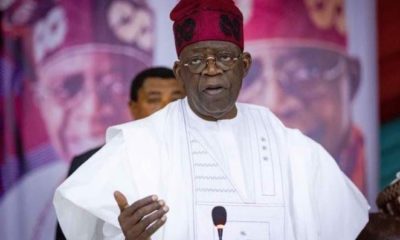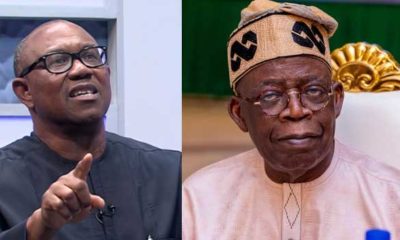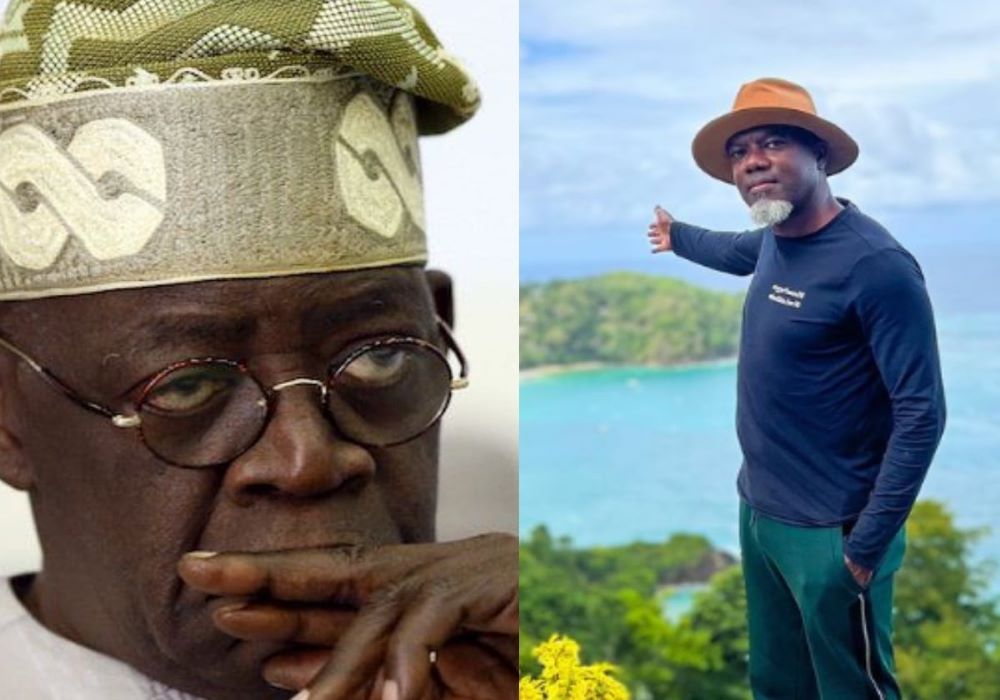Politics
APM’s Petition: Court Adjourns Judgment Indefinitely

In a highly anticipated judgment, the Presidential Election Petition Court delivered its decision on Friday regarding the petition filed by the Allied Peoples Movement (APM).
The APM had sought the disqualification of President Bola Ahmed Tinubu from the February 25 presidential election on the grounds of unlawful nomination.
The Court, after hearing the final arguments presented by the involved parties, decided to adjourn the verdict indefinitely.
APM’s petition focused on nullifying Tinubu’s election, asserting that his Vice Presidential candidate, Kashim Shettima, had unlawfully accepted nominations for two different constituencies.
Shettima initially received a nomination from the All Progressives Congress (APC) as a candidate for the Borno Central Senatorial District.
However, after Kabiru Masari, the initial Vice Presidential candidate to Tinubu, withdrew from the race, Shettima was subsequently nominated by the APC as Tinubu’s Vice Presidential candidate.
APM argued that this double nomination violated electoral regulations.
The Court’s decision will have significant implications for the presidential election, as it will determine whether President Tinubu’s candidacy stands or if it will be invalidated based on the allegations put forth by the APM.
The Allied Peoples Movement (APM) raised concerns regarding a potential breach of the Electoral Act by Kashim Shettima and the All Progressives Congress (APC) through their alleged double nomination.
The APM’s counsel, Andrew Malgwu SAN, urged the court to utilize the applicable laws to invalidate the nominations of both President Tinubu and Shettima, citing the nominations as unlawful, illegal, and unjustifiable.
On the other hand, the Independent National Electoral Commission (INEC), the first respondent in the petition, requested the Court to dismiss the petition due to its lack of merit.
INEC argued against the APM’s claims during the proceedings on Friday, asserting that the allegations did not hold sufficient grounds for the petition to proceed.
The All Progressives Congress (APC), represented by Lateef Olasunkanmi Fagbemi SAN, strongly urged the court to dismiss the petition on all grounds, characterizing it as frivolous, irritating, and unwarranted.
Fagbemi contended that the petition was invalid from the beginning, citing a Supreme Court judgment that prohibits political parties from interfering in the internal affairs of other parties, particularly regarding nomination issues.
Likewise, President Tinubu and Vice President Shettima, represented by the esteemed Chief Wole Olanipekun SAN, argued that the APM’s petition should not have been filed in the first place.
They demanded the outright dismissal of the petition, asserting that it lacked legal basis and merit.
During the court proceedings, Chief Wole Olanipekun informed the Court that the APM’s petition should have been withdrawn voluntarily following the Supreme Court’s pronouncement that no party has the authority to meddle in the nomination process of another party’s candidates for elective positions.
Olanipekun suggested that the APM should have acted honorably and withdrawn the petition accordingly.
Following the conclusion of the proceedings, Justice Haruna Simon Tsammani, the Presiding Justice of the Court, adjourned the judgment indefinitely.
Justice Tsammani assured the gathering of lawyers present in the courtroom that they would be notified as soon as the judgment was prepared and ready for delivery.
Politics
Edo LP Senator, Neda Imasuen Set To Join APC
The Labour Party (LP) in Edo State may be on the verge of losing another key figure, as Senator Neda Imasuen, representing Edo South Senatorial District, is reportedly considering a defection to the All Progressives Congress (APC).
Party insiders and political observers say the senator is under increasing pressure from APC leaders to switch allegiance, with recent developments pointing toward an imminent move.
Imasuen, who chairs the Senate Committee on Public Petitions, Ethics and Privileges, recently stated that the Supreme Court’s verdict on the LP crisis might have come too late to prevent the damage already done, which has resulted in multiple defections across the country.
READ MORE: Okpebholo Inspects Agro, Road Projects In Edo Central
The senator is said to have a close working relationship with several prominent APC figures in Edo State and has been seen at various public functions alongside them.
Notably, he once served as a senior legislative aide to his predecessor, Senator Matthew Urhoghide—now an APC member—and also acted as Director General of the APC Campaign Council for the upcoming September 21 governorship election.
Further fueling speculation, Hon. Eugene Utubor, Special Adviser to Governor Monday Okpebholo on Political Mobilisation and Engagement, visited the senator on Tuesday night to lobby him into joining the APC and supporting the governor’s developmental drive.
Sources privy to the lengthy meeting described it as productive.
In a statement following the visit, Imasuen praised Governor Okpebholo’s leadership, saying, “The governor has done remarkably well in such a short time. It is crucial that we come together to ensure the success of his vision for our people. Every well-meaning Edo citizen is encouraged to rally around the governor as he works diligently for our collective progress.”
While no official defection has been announced, Imasuen’s words and actions suggest his exit from the Labour Party could be only a matter of time.
Politics
APC Sets N5m Nomination Fee For Chairmanship Aspirants In Lagos LG Polls

The All Progressives Congress (APC) in Lagos State has released the official fees and guidelines for aspirants contesting in the upcoming local government elections scheduled for July 12.
According to the document, jointly signed by the party’s State Chairman, Pastor Cornelius Ojelabi, and Secretary, Dr. Adeola Jokomba, chairmanship aspirants will be required to pay a nomination fee of N5 million, along with an administrative fee of N500,000.
In a bid to encourage female participation in the electoral process, the APC reduced the chairmanship nomination fee for women to N2.5 million, though the administrative fee remains at N500,000.
READ ALSO: Okpebholo Welcomes Ikpea To APC, Expects More Defectors
Similarly, the party introduced incentives for young aspirants under the age of 40, offering them a 50% discount on the nomination fee while maintaining the administrative fee.
For aspirants living with disabilities, the party completely waived the nomination fee and fixed the administrative fee at N250,000.
Aspirants seeking councillorship positions will also pay fees, with male contenders expected to pay N1 million for the nomination form and N100,000 as an administrative fee.
Female aspirants will pay N250,000 for the nomination form, while the administrative fee remains the same.
The APC noted that youth aspirants applying for councillorship positions would also receive a 50% discount on their nomination fee, although they will still be expected to pay the full administrative fee.
For persons living with disabilities contesting for councillorship seats, the nomination form will be issued at no cost, but an administrative fee of N50,000 will apply.
The party also clarified that no separate fee will be charged for vice chairmanship positions.
“These fees shall be paid by way of bank draft in favour of the All Progressives Congress, Lagos State, State,” the guidelines stated.
Beyond the financial requirements, the APC outlined other conditions for eligibility. Chairmanship aspirants are expected to be at least 30 years old, while councillorship hopefuls must have attained the age of 25.
Academic qualifications require a minimum of a school certificate or its equivalent, with higher qualifications considered an added advantage.
The guidelines also set out the endorsement process for aspirants. For chairmanship hopefuls, five registered party members who are voters within the aspirant’s ward, local government or LCDA must endorse their nomination forms.
Councillorship aspirants will need the signatures of 20 registered party members from their wards.
The party emphasized the need for all aspirants to prove their loyalty to the APC and show active involvement in party activities.
Each candidate must also sign the party’s Code of Conduct.
“Only aspirants cleared by the Screening Committee shall be eligible to stand for election at the party’s primaries,” the guidelines noted.
In line with constitutional provisions, the APC further stressed that any party officeholder intending to contest must resign their position at least 30 days before the election or the party primary.
“All aspirants shall comply with constitutional provisions and requirements applicable to the public office they seek to contest for,” the party added.
Politics
Lad Who Stood In Front Of Obi’s Convoy Apprehended For Street Fighting – Police

The travails of Alabi Quadri, the chap who became famous by his rousing reception in front of the Labour Party’s (LP) presidential candidate Peter Obi’s convoy during Nigeria’s 2023 election has been traced to a violent street fight in the Amukoko area of Lagos.
According to the Lagos State Police Command, the 18-year-old was arrested and charged to court after being linked to street violence in January.
This was disclosed in a statement on its X handle signed by the command’s Public Relations Officer, CSP Benjamin Hundeyin, on Saturday.
According to Hundeyin, the incident happened on January 22 when a group of youths clashed in a violent street fight that caused panic in the community.
He added that several people were injured, while public and private property were damaged.
Hundeyin asserted that some innocent passersby were robbed during the chaos.
ALSO READ: Edo Prescribes Death By Hanging For Kidnappers
He wrote, “The Lagos State Police Command is aware of public concerns surrounding the case of Alabi Quadri, an 18-year-old who was remanded to correctional service following his involvement in violent attacks, public disturbance, causing extensive damage to public and private properties, and injuries to persons standing by in the Amukoko area of Lagos State earlier this year.
“On January 22, 2025 to be precise, a serious breach of public peace and extensive damage to public and private properties occurred in Amukoko when groups of youths engaged in violent confrontations that escalated into street fights for all, causing widespread violence, panic, and chaos.
“During the chaos, a number of innocent passersby were reported to have been robbed and injured.”
These, the Police spokesman maintained made officers quickly swing into the matter, with the aid of community members who witnessed the event offering useful information.
He added that victims of the robbery also gave statements and identified some of those involved.
He explained further that based on the investigation, Quadri and four others were arrested and taken to court.
He noted that the court then ordered that they be kept in custody while the legal process continues.
“In response, police officers of the command immediately launched an investigation into the incident.
“More crucial information was provided by members of the community, some of whom witnessed the incident and recognised several individuals involved.
“Victims of the robbery also came forward to give statements and positively identified the perpetrators. Following a thorough and transparent investigation, Alabi Quadri and four others were arrested and charged to court in connection with the crime.
“The suspects were remanded by the court to a correctional facility pending the conclusion of legal proceedings in the matter.
“The Lagos State Police Command undoubtedly reiterates its commitment to upholding the rule of law to ensure justice in all matters and also ensuring the safety and security of all residents,” Hundeyin added.
The command expressed commitment to justice and safety for all residents, urging the public to remain calm and allow the courts to decide the case.
“All police actions taken in this case have been in the laid-down processes and in accordance with due process, procedures, and based on credible evidence gathered during the investigation.
“We urge the public to remain calm and allow the judicial process to take its course and be fully exhausted in the case.
“The command remains open to engaging with the general public, opinion groups, and community stakeholders to transparently clarify every concern and ensure justice is served fairly and transparently.
“It’s statutory procedure in the Criminal Justice System and codes that police actions terminate where matters are taken to court.
“Members of the general public in Lagos State are enjoined to stay calm and peaceful, and allow peace to reign to ensure justice for all,” it added.
Recall that Quadri was freed on Thursday by a Magistrate Court in Apapa following legal advice from the Lagos State Director of Public Prosecutions, which found no evidence to support the armed robbery charge against him.
His lawyer, Inibehe Effiong, said Alabi’s arrest and detention were part of a “diabolical frame-up” by two local thugs known in the Amukoko area as Lege and Baba Waris.
According to Effiong, the two men allegedly kidnapped Quadri near his home and handed him over to the police, claiming he was part of a street fight.
Effiong maintained that he had been receiving threats from the same individuals since 2023 because he received donations from supporters of Obi.
The family was reportedly pressured by some community leaders to buy a cow and host a feast to make peace.
Although the case was initially said to be about a street fight, the police charged Quadri with armed robbery on January 26.
He was sent to prison along with four adults he didn’t know.
Quadri’s age was also wrongly recorded as 18, according to Effiong.



















